What a US$ 345 million judgment means for Greenpeace
Gaby Flores
A US court has just sided with fossil fuel pipeline giant Energy Transfer and ordered Greenpeace International and Greenpeace entities in the US to pay US$ 345 million. Quick backstory: last year, a Morton County jury of nine reached a verdict in Energy Transfer’s abusive intimidation lawsuit against Greenpeace entities in the US (Greenpeace Inc, Greenpeace Fund), and Greenpeace International. The new judgment from the North Dakota court rejects portions of the absurd jury verdict delivered last March but still awards hundreds of millions of dollars to ET without a sound basis in law, failing to solve the injustices of the case. This judgement is the biggest damage award ever imposed on Greenpeace organisations. It’s meant to shut the movement up. So let’s be clear: this type of corporate bullying is designed to rob us of our rights and freedoms. Energy Transfer has pursued this intimidation lawsuit because Greenpeace USA and Greenpeace International dared to show solidarity with Indigenous environmental defenders who oppose the climate-wrecking Dakota Access Pipeline. It was never about justice and Energy Transfer’s SLAPP suit remains a blatant attempt to silence free speech, erase Indigenous leadership of the Standing Rock movement, and punish solidarity with peaceful resistance to the Dakota Access Pipeline. So what comes next? Greenpeace International and Greenpeace organisations in the US will seek a new trial, and if that is denied, appeal the judgment with the North Dakota Supreme Court. At the same time, Greenpeace International has a suit pending against Energy Transfer in the Netherlands under the EU’s anti-SLAPP directive – a landmark test case against corporate bullying. Energy Transfer’s SLAPPs are part of a wave of abusive lawsuits filed by Big Oil companies like Shell, Total, and ENI against Greenpeace entities in recent years but we will continue to resist intimidation tactics. The fight against Energy Transfer’s SLAPP continues — and it is far from over. We will not be silenced. We will only get louder, joining our voices to those of our allies all around the world against the corporate polluters and billionaire oligarchs who prioritise profits over people and the planet. Tell Energy Transfer and other corporate bullies: Stop your attacks on free speech. Texte intégral (1314 mots)
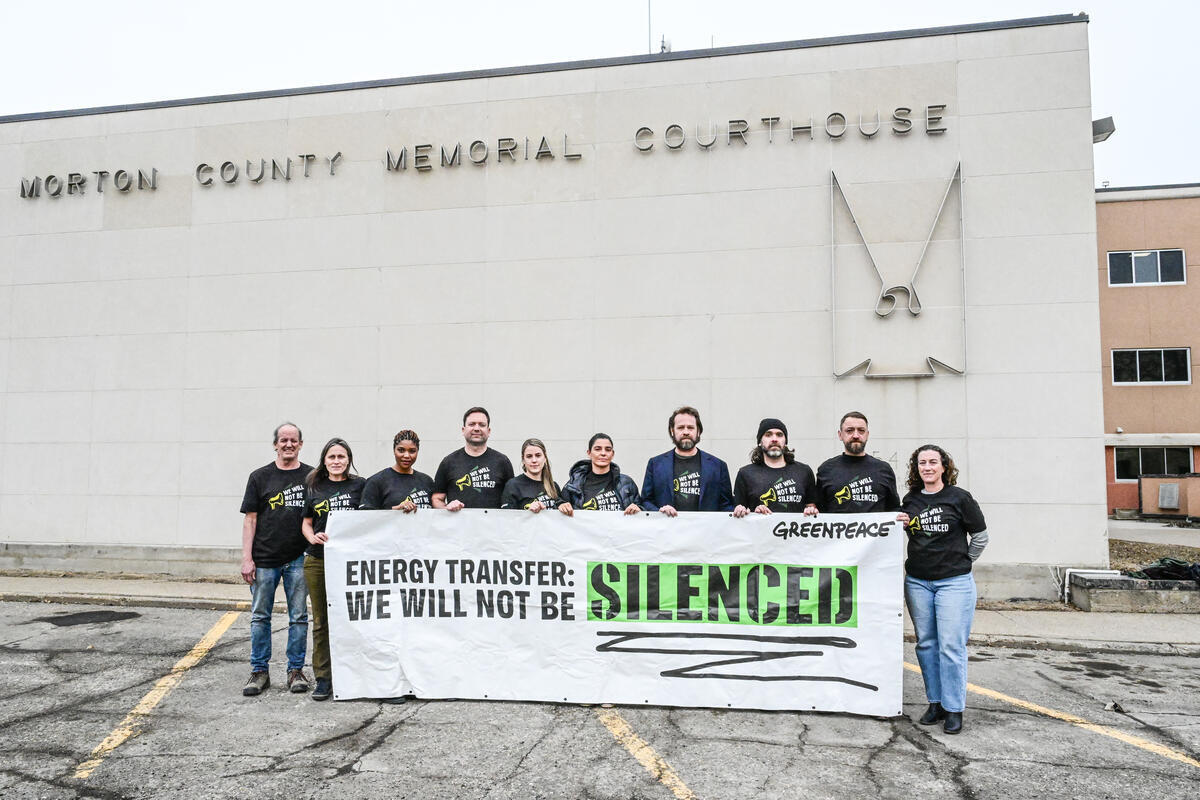
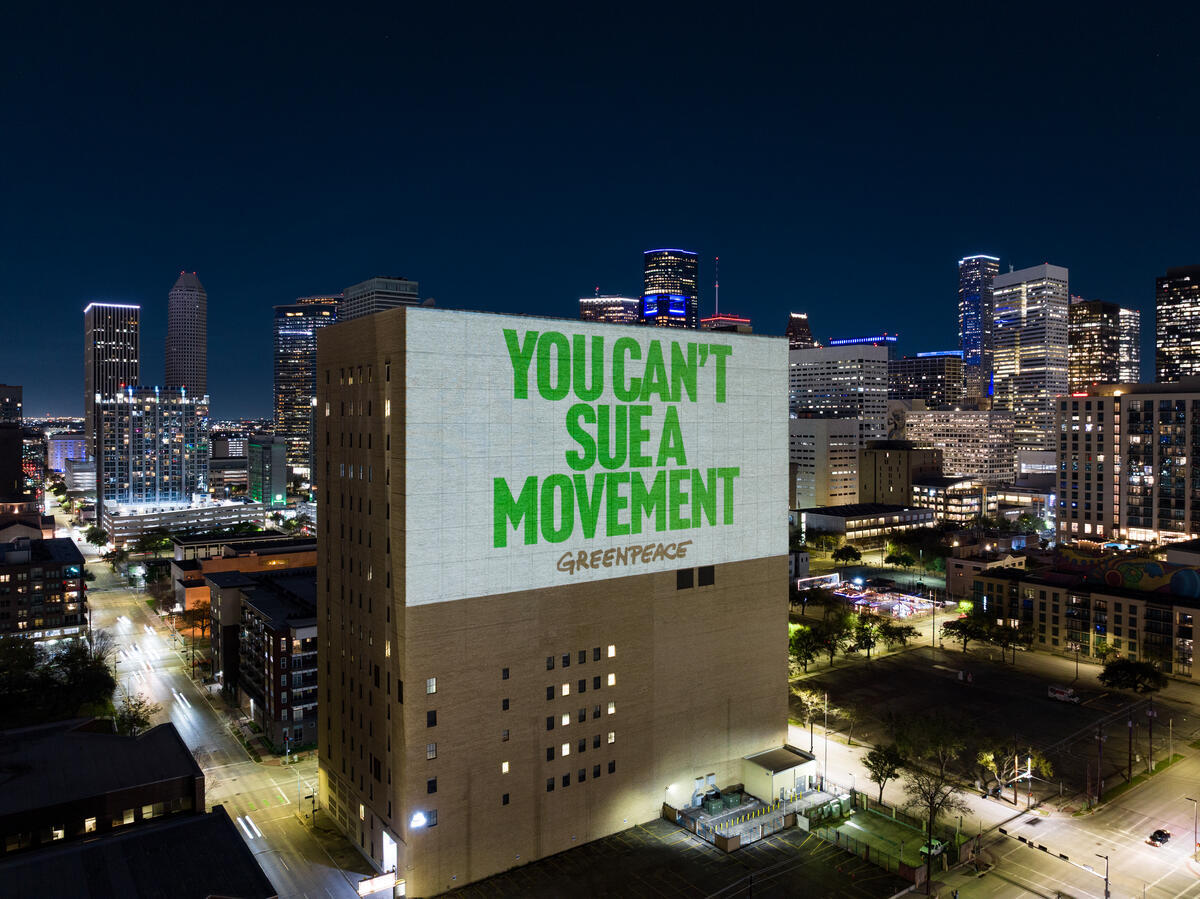
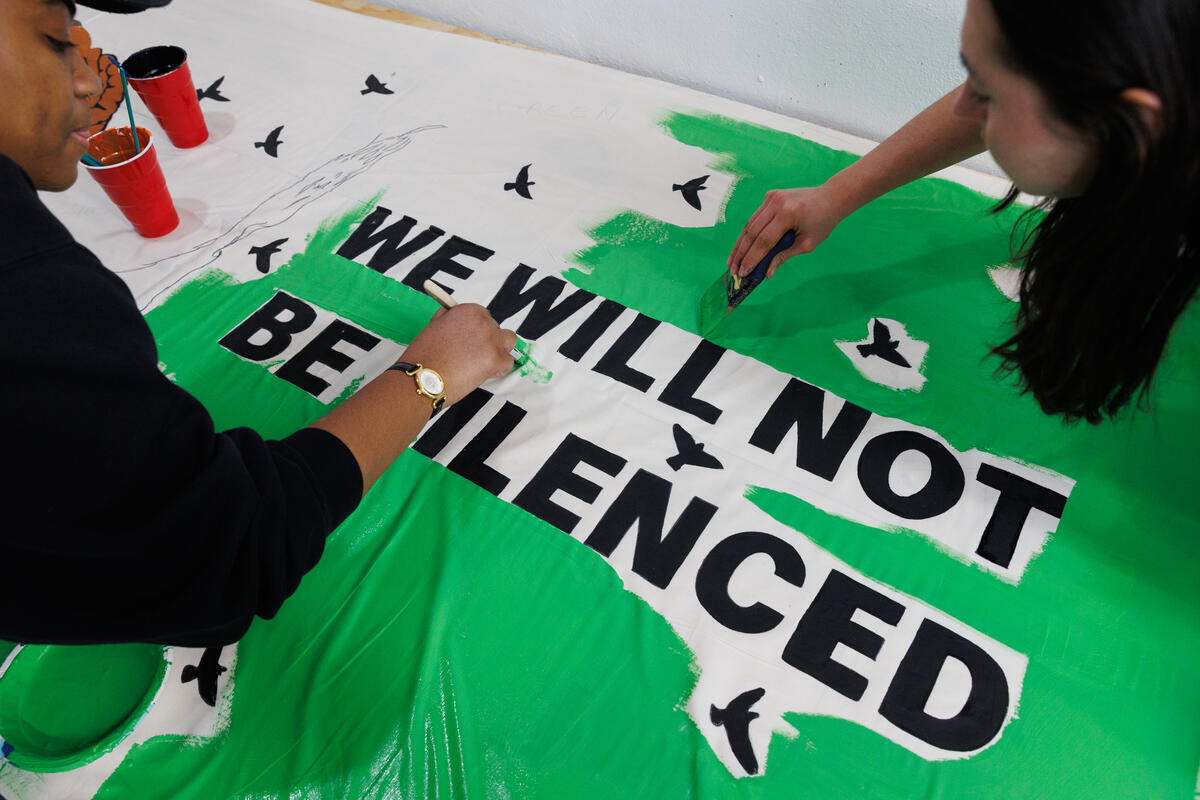
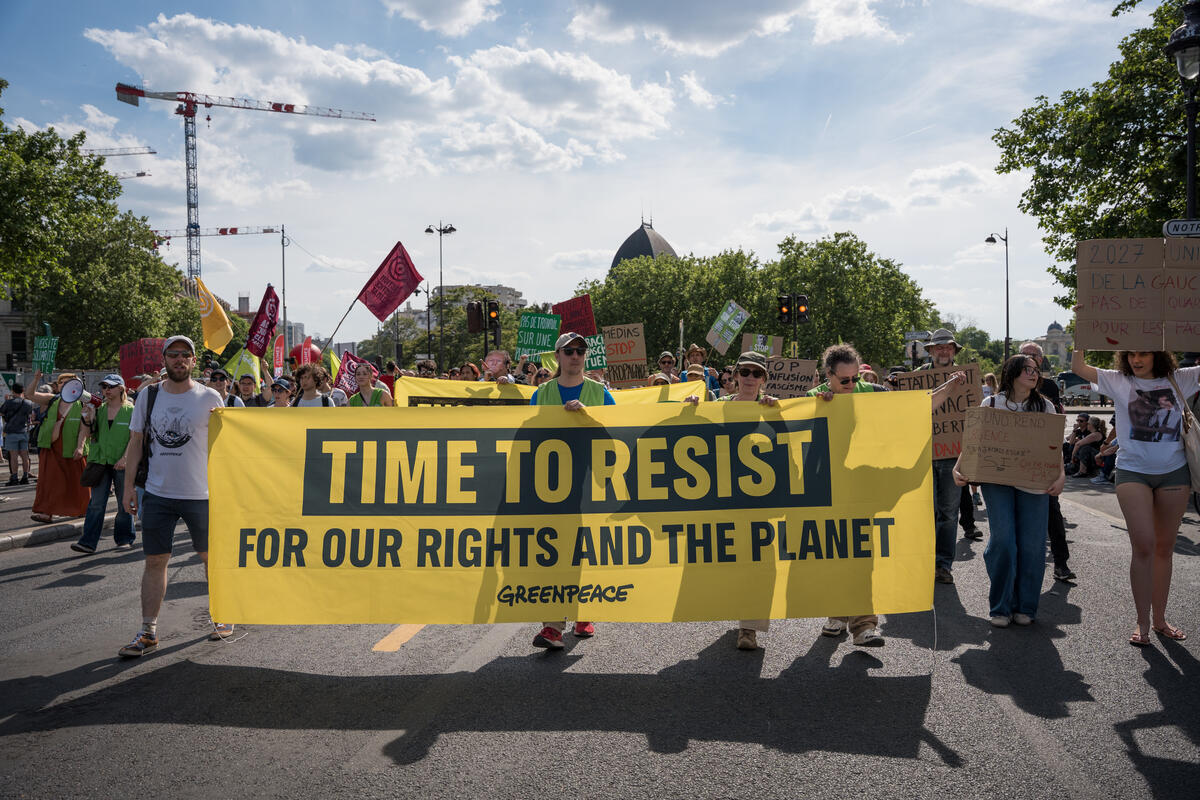
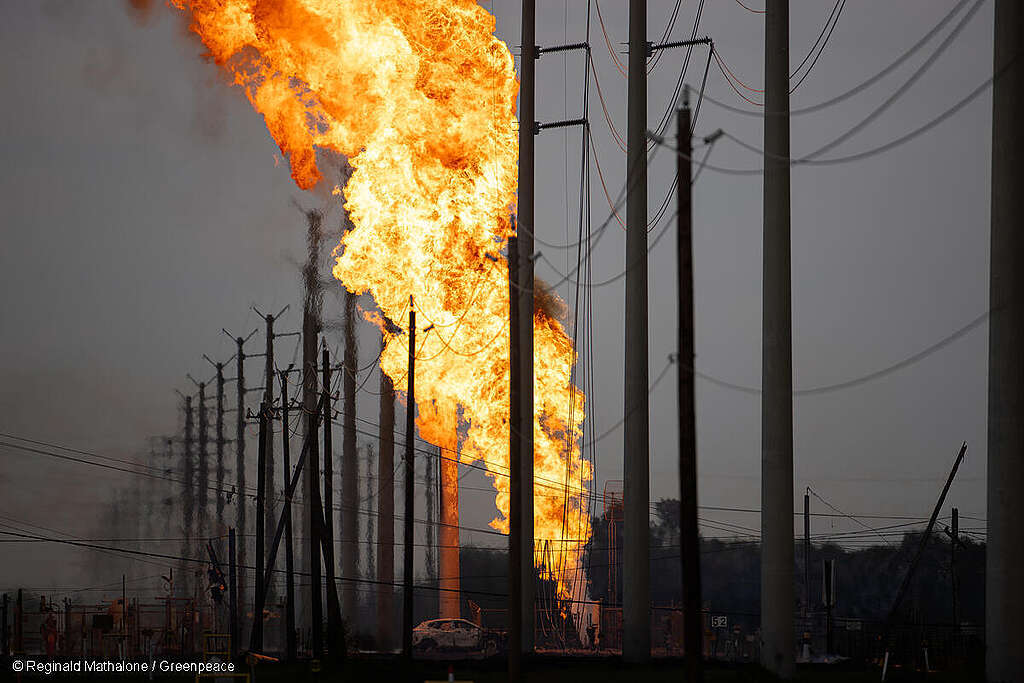
Greenpeace organisations to appeal US$ 345 million North Dakota court judgment in Energy Transfer’s intimidation lawsuit
Greenpeace International
Mads Christensen, Greenpeace International Executive Director said: “Energy Transfer’s attempts to silence us are failing. Greenpeace International will continue to resist intimidation tactics. We will not be silenced. We will only get louder, joining our voices to those of our allies all around the world against the corporate polluters and billionaire oligarchs who prioritise profits over people and the planet. “With hard-won freedoms under threat and the climate crisis accelerating, the stakes of this legal fight couldn’t be higher. Through appeals in the US and Greenpeace International’s groundbreaking anti-SLAPP case in the Netherlands, we are exploring every option to hold Energy Transfer accountable for multiple abusive lawsuits and show all power-hungry bullies that their attacks will only result in a stronger people-powered movement.” The Court’s final judgment today rejects some of the jury verdict delivered in March 2025, but still awards hundreds of millions of dollars to ET without a sound basis in law. The Greenpeace defendants will continue to press their arguments that the US Constitution does not allow liability here, that ET did not present evidence to support its claims, that the Court admitted inflammatory and irrelevant evidence at trial and excluded other evidence supporting the defense, and that the jury pool in Mandan could not be impartial.[1][2] ET’s back-to-back lawsuits against Greenpeace International and the US organisations Greenpeace USA (Greenpeace Inc.) and Greenpeace Fund are clear-cut examples of SLAPPs — lawsuits attempting to bury nonprofits and activists in legal fees, push them towards bankruptcy and ultimately silence dissent.[3] Greenpeace International, which is based in the Netherlands, is pursuing justice in Europe, with a suit against ET under Dutch law and the European Union’s new anti-SLAPP directive, a landmark test of the new legislation which could help set a powerful precedent against corporate bullying.[4] Marco Simons, Interim General Counsel at Greenpeace USA and Greenpeace Fund said: “Speaking out against corporations that cause environmental harm should never be deemed unlawful. It is guaranteed by the US Constitution, and is essential to the protection of communities and the health of democracy. This is a setback, but the movement to defend people and the planet has always faced setbacks and resistance, and Energy Transfer will fail in its goal of silencing its critics. “The absurdity of this judgment can easily be illustrated. These Greenpeace organisations have been held responsible for supposedly delaying a pipeline that to this day does not have legal authority to operate, and which was actually delayed by the decisions of the US Army Corps of Engineers. The judgment includes tens of millions of dollars for signing a letter also signed by 500 other organisations, which echoed statements made in United Nations reports. If the courts still believe in justice, this result will not stand.” Energy Transfer’s SLAPPs are part of a wave of abusive lawsuits filed by Big Oil companies like Shell, Total, and ENI against Greenpeace entities in recent years.[3] A couple of these cases have been successfully stopped in their tracks. This includes Greenpeace France successfully defeating TotalEnergies’ SLAPP on 28 March 2024, and Greenpeace UK and Greenpeace International forcing Shell to back down from its SLAPP on 10 December 2024. ENDS Photos and Videos can be accessed from the Greenpeace Media Library. Notes: [1] The judgment entered by North Dakota District Court Judge Gion follows a jury verdict finding Greenpeace entities liable for more than US$660 million on March 19, 2025. Judge Gion subsequently threw out several items from the jury’s verdict, reducing the total damages to approximately US$345 million. [2] Public statements from the independent Trial Monitoring Committee [3] Energy Transfer’s first lawsuit was filed in federal court in 2017 under the RICO Act – the Racketeer Influenced and Corrupt Organizations Act, a US federal statute designed to prosecute mob activity. The case was dismissed in 2019, with the judge stating the evidence fell “far short” of what was needed to establish a RICO enterprise. The federal court did not decide on Energy Transfer’s claims based on state law, so Energy Transfer promptly filed a new case in a North Dakota state court with these and other state law claims. [4] Greenpeace International sent a Notice of Liability to Energy Transfer on 23 July 2024, informing the pipeline giant of Greenpeace International’s intention to bring an anti-SLAPP lawsuit against the company in a Dutch Court. After Energy Transfer declined to accept liability on multiple occasions (September 2024, December 2024), Greenpeace International initiated the first test of the European Union’s anti-SLAPP Directive on 11 February 2025 by filing a lawsuit in Dutch court against Energy Transfer. The case was officially registered in the docket of the Court of Amsterdam on 2 July, 2025. Greenpeace International seeks to recover all damages and costs it has suffered as a result of Energy Transfers’s back-to-back, abusive lawsuits demanding hundreds of millions of dollars from Greenpeace International and the Greenpeace organisations in the US. The next hearing in the Court of Amsterdam is scheduled for 16 April, 2026. Contacts: Greenpeace International Press Desk, +31 (0)20 718 2470 (available 24 hours), pressdesk.int@greenpeace.org Join the Greenpeace SLAPP Trial WhatsApp Group for our latest updates Texte intégral (1170 mots)
Mandan, North Dakota — Greenpeace International and Greenpeace organisations in the US announce they will seek a new trial and, if necessary, appeal the decision with the North Dakota Supreme Court following a North Dakota District Court judgment today awarding Energy Transfer (ET) $US 345 million. ET’s SLAPP suit remains a blatant attempt to silence free speech, erase Indigenous leadership of the Standing Rock movement, and punish solidarity with peaceful resistance to the Dakota Access Pipeline. Greenpeace International will also continue to seek damages for ET’s bullying lawsuits under EU anti-SLAPP legislation in the Netherlands.
South African community health worker delivers baby during historic flood disaster
Lerato Mutsila and Tamsin Metelerkamp
Birthing babies can become way more complicated in extreme weather, as can managing everyday healthcare and medical emergencies. But such pressures will only increase as fossil-fuelled disasters intensify. Here’s how one South African mother and community care worker handled childbirth in a Red Level 10 storm without access to health facilities – and why governments need to invest in climate-resilient infrastructure and make polluters pay for the mounting cost of their climate impacts. Cut off by floodwaters and without access to a clinic, a South African home-based carer was forced into an extraordinary role when a young woman went into labour during recent floods. In Mbaula village, amid destruction and isolation, an impromptu baby delivery became a symbol of hope and solidarity in a community left on the margins of healthcare. On Wednesday 14 January, floods caused by a low-pressure system that began in Mozambique, but quickly moved into the neighbouring South African provinces of Mpumalanga and Limpopo, caused immense destruction. Homes were gutted, roads washed away and more than 30 lives were reportedly lost. In neighbouring countries, the reported death toll went into the hundreds and nearly a million people were displaced. At the heart of the areas most affected by the floods was Mbaula, a village in Giyani, Limpopo province.Daily Maverick had reported about homes and lives that lay in ruin in the aftermath of the extreme weather event, but in the words of Mbaula resident Maggie Sethagane, it was also the day “God performed a miracle”. It was on this day, as the Mbaula River swelled and flooded part of the village, that she (with no medical equipment or access to healthcare services) helped a young mother bring new life into the village. Sethagane has been working as a home-based carer since 2001. In her role as a community health worker, she takes care of the sick, visiting them in their homes, explaining treatment and assisting them to take their medication correctly. But on the first day of the floods, she found herself taking on another role – midwife. Late that evening, Evidence Ramoshaba, a pregnant mother experiencing contractions, came to Sethagane’s door asking for help to reach the local clinic as she was in pain. Villages like Mbaula do not have their own clinic, forcing residents to travel long distances for care. A mobile clinic visits the area once a month, along with an ambulance. However, it is difficult to get an ambulance out to the village at times, even in better weather conditions. The nearest health facility, Makhuva Clinic, was in a neighbouring village, which could only be reached by roads that had been blocked by rapidly swelling rivers. “I told her, ‘It is impossible for me to take you to the clinic because there is no road. It has rained a lot. And even if we used the road through Phalaubeni… to get to Makhuva clinic, there is a river ahead. We won’t be able to pass,’ ” Sethagane recounted. With no other option, Sethagane advised Ramoshaba to return home and wait with her sister-in-law until it was time for the birth. A few hours later, when the mother’s family told Sethagane that the situation was becoming dire, the home-based carer came across to assist. She had no equipment, not even gloves, as the clinic issues these to community health workers on an as-needed basis. “I told her, ‘Push, push, push, there is no other way’. She pushed, and the child came out. At that point, we didn’t have a razor blade [to cut the umbilical cord], we didn’t have anything. We didn’t know what we were going to do,” said Sethagane. She told Ramoshaba to sleep, with the baby in her arms, until they could figure out what to do. It was only the following morning that Sethagane, along with Ramoshaba’s mother, was able to organise a razor and purchase wool from the local seamstresses, who sewed xibelani, traditional Xitsoga skirts. Using those two everyday household items, Sethagane was able to cut the umbilical cord and discard the placenta. “We took a risk, but there was nothing else we could have done,” said Sethagane. “The child was born on Thursday, 16 January… The child only went to the clinic when she was three days old on the 19th because … the roads were not alright. You could not use them. It was basically on Monday that I took [Ramoshaba] to the clinic when I was going to work. That’s when they checked her to make sure she was alright, and the baby as well.” The baby girl, Kutshemba, which means “hope” or “believe in” in Xitsonga, was found to be healthy despite the unusual circumstances of her birth. “This child was born on the day of the disaster. She came on a very hard day, a day with problems… God performed a miracle by making sure this child was born okay, even though she wasn’t born in a clinic,” said Sethagane. Cradling a sleeping Kutshemba in her arms, a quietly-spoken Ramoshaba told us that she chose to give her child that name because the manner in which she was born held no promise that the baby would survive. “It was 10pm or 10.30pm, and the rain was falling hard. It was raining so hard… there was no way we could leave the village. There was water everywhere, and the bridge to Makhuva was blocked. There was nowhere to go, but we did try our best; that’s how the baby was born at home,” she said, motioning to the house. Ramoshaba said she had lower back and abdominal pain for three days with no access to medication before she could seek medical attention at Makhuva Clinic. As storms, floods, fires, and droughts are hitting us more frequently and with greater intensity around the world, the costs of the climate crisis are going up significantly. Countries in the Global South not only bear the brunt of the climate crisis due to increased frequency and severity of extreme weather events, but must do so with what’s left after centuries of colonial looting. Communities already battling to expand public infrastructure (like clinics and hospitals) must now rebuild what is destroyed during weather disasters. Bold taxes or fines on oil and gas corporations would help to raise vital revenues which should be used to ensure that communities are given the support they need to recover, rebuild and invest in climate solutions. After all, the fossil fuels industry is single-handedly the biggest driver of climate impacts. Hopefully these taxes will also serve as a deterrent to their climate-wrecking polluting activities, and actually curb the climate impacts. Lerato Mutsila and Tamsin Metelerkamp are Daily Maverick journalists based in South Africa. A version of this article was originally published by Daily Maverick Earth on 8 February 2026. Guest authors work with Greenpeace to share their personal experiences and perspectives and are responsible for their own content. Sign the pact, record your story. Join the global movement to make polluters pay. Texte intégral (2222 mots)
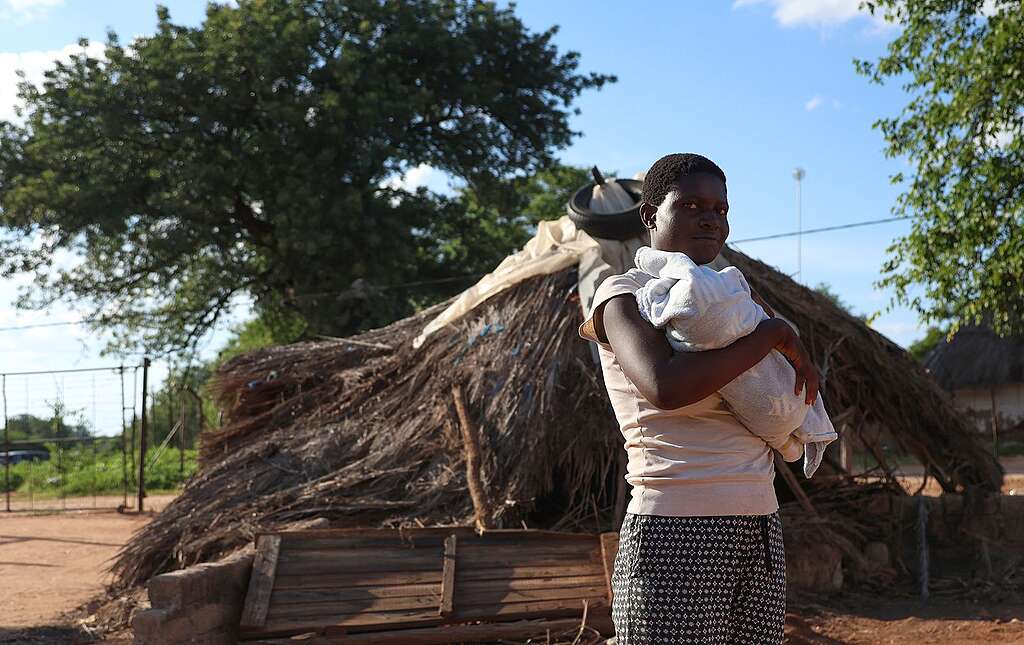
Health facilities are hard to access even in better weather. Extreme conditions make it impossible
‘Hope’ despite the storm
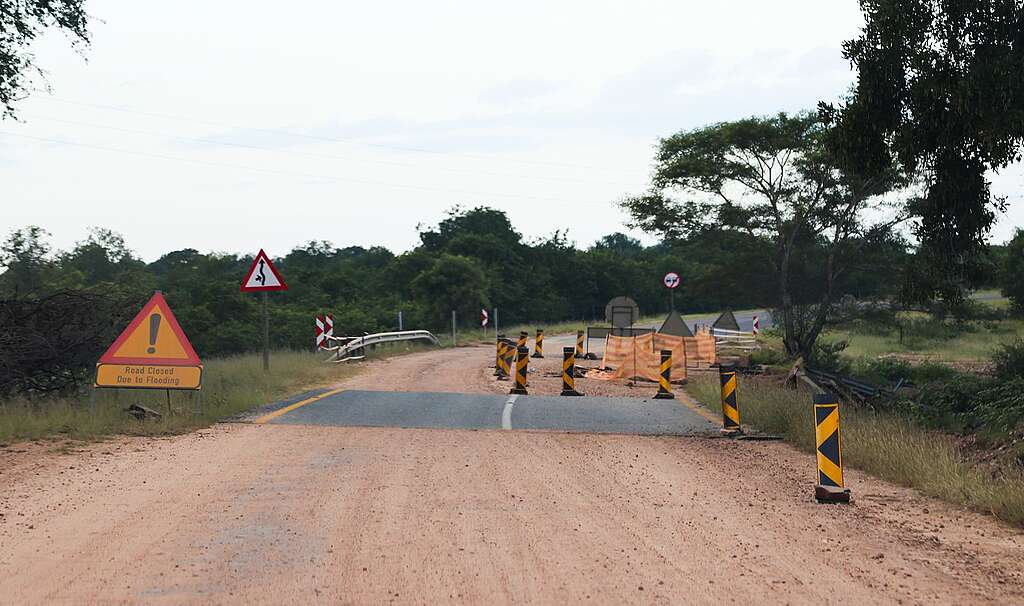
Editor’s note: Make polluters pay
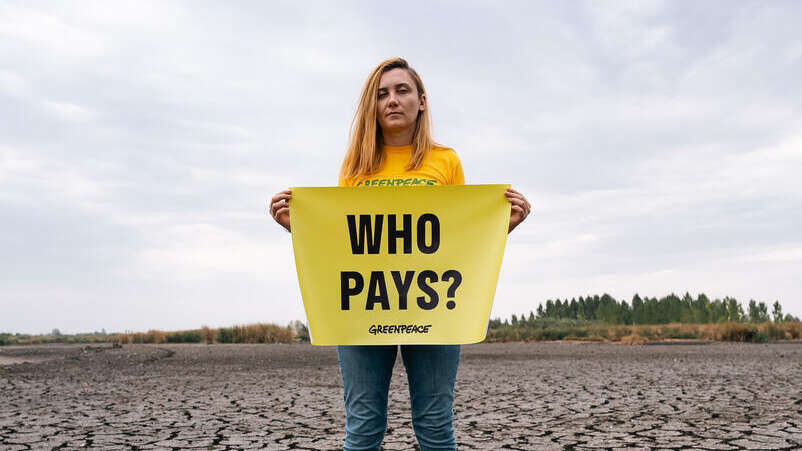
🌱 Bon Pote
Actu-Environnement
Amis de la Terre
Aspas
Biodiversité-sous-nos-pieds
🌱 Bloom
Canopée
Décroissance (la)
Deep Green Resistance
Déroute des routes
Faîte et Racines
🌱 Fracas
F.N.E (AURA)
Greenpeace Fr
JNE
La Relève et la Peste
La Terre
Le Lierre
Le Sauvage
Low-Tech Mag.
Motus & Langue pendue
Mountain Wilderness
Negawatt
🌱 Observatoire de l'Anthropocène

 (@greenpeace)
(@greenpeace)